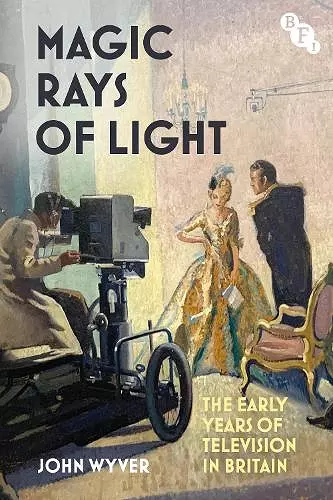Magic Rays of Light
The Early Years of Television in Britain
Format:Paperback
Publisher:Bloomsbury Publishing PLC
Published:8th Jan '26
Currently unavailable, our supplier has not provided us a restock date

An original history of the early years of television in Britain and television's role in the social and cultural life of the nation.
On the evening of 26 January 1926, inventor John Logie Baird held a public demonstration in his workspace on London’s Frith Street of a ‘seeing by wireless’ apparatus that he and many others had been working towards, television. In the years that followed, variants of this astonishing device produced programming that was rich, complex and excitingly imaginative. Familiar television genres, including studio drama, quiz shows, variety spectaculars and sports broadcasts, were all fully realised in the 1930s. At the same time, early television was often strikingly different from later domestic broadcasting.
Television began with intimate entanglements with interwar cinema, theatre, music and dance. And, despite reaching only tiny audiences, from its beginnings television responded to key strands of social history, embracing legacies of the Great War, changing roles for women, suburban living and more.
Magic Rays of Light is a unique and comprehensive cultural history of early television, exploring its technologies and institutions, while also celebrating the programmes and the people, the ideas and the innovations of the first decade of what would become the most consequential medium of the subsequent century.
It is entirely appropriate that this book's title mentions magic: what John Wyver has achieved here is nothing short of miraculous. Wyver takes a period of television production long thought to be out of our grasp and constructs a painstakingly researched history of its key personnel, programmes, and technological developments. He illuminates the relationships between early television and cinema, theatre and radio, and highlights the creativity and innovation of those making it. This will change everything we understand about the early development of television in the UK. -- Helen Wheatley, Professor of Film and Television Studies, University of Warwick, UK
Wyver offers us a startlingly original way of understanding television’s origin story. Through meticulous research and brilliant storytelling, he reveals just how intimately connected this strange invention was to inter-war British cultural life, as well as conveying all the delicious drama that accompanied its birth as a new mass medium. Wonderful. -- David Hendy, Emeritus Professor of Media and Cultural History, University of Sussex, UK
This is a meticulously-researched and extremely detailed account of the early days of television in Britain. Wyver has produced a thoroughly engaging account of those pioneering years and this book needs to be on the shelf of everyone with an interest in media history. -- Jamie Medhurst, Professor of Film and Media at Aberystwyth University, UK
The cluster of centenaries of television make this the ideal moment to publish an account of its infancy. Who better to write that history than John Wyver, who unites the deep intuitions of the programme-maker with the bloodhound instincts of the researcher-scholar? What television could have been, and what it became, make for a compelling account that will immediately become the standard work on the subject. -- Tim Boon, author, Films of Fact (2008)
ISBN: 9781839028205
Dimensions: 232mm x 156mm x 30mm
Weight: 900g
528 pages